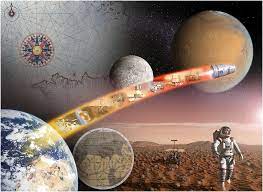Introduction to the importance of space exploration
Space exploration is extremely important to modern humanity. This importance is closely related to our science, economy, survival, and development. In this essay, we will explore the importance of space exploration and our expectations for the future.
The objectives of this paper are as follows: first, I will highlight the importance of space exploration in terms of global environmental monitoring, technological advancement, and economic opportunities. Then, I will examine current and future space exploration projects and discuss how they are shaping our future. Finally, we will cover why space exploration is essential for the survival and development of humanity.
The importance of space exploration: progress for the planet and humanity
Space exploration is crucial for the development of the planet and humanity. First, because it provides advances and benefits in space science. Monitoring the Earth’s environment and climate Space exploration is an important tool for studying and understanding the Earth’s environment and climate. Observations from satellites help track climate change and prevent environmental degradation. Space exploration fuels advances in communications and location technologies, for example, GPS systems and internet communications are the result of space technology, and their positive impact on our daily lives is ever-expanding.
Space exploration is also important for the space economy. This is because space can be an important place for future flights and resource extraction, and there are astronomically large amounts of energy and raw materials, which are expected to promote the development of the space economy. For example, space industry and economic development Space exploration creates new industrial sectors and promotes economic development. Industries such as rocket manufacturing, space hotels, and space tourism are expanding, which contributes to job creation and economic growth.
The future of space exploration: Space adventures made real
Introducing current space programs and projects
International Space Station The International Space Station supports human activities in space through multinational cooperation. It contributes to scientific research, education, technology development, and more.
Here are some examples of research.
– Space science research: The International Space Station hosts research in a variety of scientific fields. Unique among these is research in an environment with virtually no gravity. This allows physicists to explore the basic laws of physics without the influence of gravity. Biologists study the health effects of life in space, and chemists study chemical reactions in space.
– Education and educational materials development: The International Space Station develops and provides a variety of educational programs and materials for students and teachers interested in space exploration. These programs are intended to promote science education and generate excitement about spaceflight and come in a variety of forms, including videos, textbooks, websites, and workshops.
– Technology development and testing: One of the important missions of the International Space Station is to conduct technology testing and development in the space environment. Examples include developing solar panels, improving environmental control systems on board spacecraft, and developing and testing space robots. These technologies improve the safety and efficiency of spaceflight and explore possible applications on Earth.
– Space anthropology research: The International Space Station is a place to study the effects of space travel on human life and health. Studies of long-term space travel are conducted to understand the physiological, psychological, and medical issues that arise during spaceflight and to develop methods to overcome them.
– Earth observation and environmental monitoring: The International Space Station is also used for Earth observation and environmental monitoring. Satellites collect data and conduct research for atmospheric research, ocean monitoring, and natural disaster prediction to understand environmental changes on Earth and contribute to environmental protection.
In addition, we are sending missions to other planets with exploration instruments such as unmanned probes. In particular, the ongoing mission to Venus and other planets located in close proximity to Earth are contributing to our understanding of exoplanets. These missions play an important role in expanding our knowledge of the universe.
Venus is one of the few planets with similar size and conditions to Earth, making it a scientifically interesting object because of its unusual environment. Venus missions promote a better understanding of the planet by studying its atmosphere, surface, climate, geology, and comparison to Earth.
In addition, Venus’ harsh environment can be seen as an extreme example of the greenhouse effect. By investigating Venus’s atmosphere, these missions will help us understand the mechanisms of the greenhouse effect and provide information that will benefit Earth’s climate models. By studying Venus’ geologic activity and internal structure, as well as its exterior, we contribute to understanding how the planet’s interior works in comparison to Earth. This is an important area of planetary science and space geoscience.
Exploring Mars, another planet close to Earth
The Mars mission is one of the most active planetary exploration missions currently underway. It is possible that Mars has undergone historical processes similar to Earth’s, and Mars exploration is an effort to find traces of them. By studying Mars’ atmosphere, underground water, geologic features, and more, we gain insight into the planet’s past and future.
A variety of spacecraft and instruments are used to explore Mars. Typical spacecraft exploring Mars include NASA’s “Hopper” (Perseverance) rover, the “InSight” mission, and the European Space Agency’s (ESA) “Mars Express” and “ExoMars” missions.
It also focuses on studying the planet’s surface and geology. By studying Mars’ surface features, volcanic activity, or traces of rivers and lakes, we hope to understand its geologic history and geologic activity. Given the similarities between Mars and Earth
studying the atmosphere of Mars is also an important component of climate modeling and gaining insight into atmospheric chemistry on Earth. Through atmospheric investigations, we are studying the climate, greenhouse effect, and atmospheric composition of Mars and comparing it to Earth to understand differences from Earth’s climate.
We also consider the presence of icy terrain on Mars that has a similar morphology to the Arctic.
We are investigating the presence and distribution of water. Numerous research methods are being employed, and the discovery of water ice, bases, and subsurface objects on the surface of Mars has implications for future spaceflight and resource utilization.
These similarities have led researchers around the world to consider whether there is life on Mars. Mars exploration is concerned with investigating the soil and subsurface water on Mars, and the possibility of life underground. This is important for finding signs of subsurface life or ancient microbes on Mars.
There are also missions to other bodies in the solar system, such as meteors, asteroids, or moons of exoplanets. These missions advance our understanding of solar system formation and evolution, the origin and distribution of life, space chemistry, and the possibility of life in environments other than Earth.
Theory While Studying the Universe
There is one theory that one man created while studying the universe. It is Einstein’s theory of relativity, which is one of the important theories explaining the interrelationship of time and space. This theory shows that time can be experienced differently in different environments. In this regard, the concept of time travel can have relevance to space exploration.
For example, Einstein’s theory opens up the possibility that the time that space explorers experience while traveling in space may be different from the time they experience on Earth. This could emphasize the importance of considering time-related theories in future space exploration missions, and space travel could be an opportunity to study the phenomenon of time travel in the future.
Einstein’s theory of relativity revolutionizes space exploration missions by treating time and space as relative. Based on the fundamental concept that the speed of light is constant, the theory is enhancing space exploration in the following ways.
First, by accounting for the constancy of the speed of light, exploration missions can accurately predict planetary interactions, the passage of time, distance calculations, and more. This plays an important role in accurately planning flight paths and spacecraft movements.
In addition, the relationship between the speed of light and spaceflight is an important part of relativity. Because spaceflight occurs at speeds close to the speed of light, the theory allows us to understand that time can slow down or speed up relatively, so we need to accurately account for time changes in flight paths and spacecraft.
Relativity is also used to explain gravity and the curvature of space. This helps us understand the effects of gravity around other planets or celestial bodies, and is especially important for landing and taking off from planets like Mars and Venus.
Space’s role in resource acquisition and Earth defense Space is an important place for humanity to acquire resources and defend Earth. Utilizing resources in space can reduce the likelihood of depletion on Earth, and space systems have the potential to protect us from off-Earth dangers.
Space Technology and Innovation
In 2023, there have been many changes in the average temperature of the Earth, along with numerous climate changes. The greenhouse effect is caused by the intensification of carbon dioxide emissions due to human technological advancement, and this year, the rate of glacier area reduction in the Arctic and Antarctic is accelerating. In response, experts are bringing new technologies from space.
First, solar panels are responsible for the efficient collection and conversion of solar energy into electrical energy. They are responsible for efficiently collecting solar energy to generate electricity. Solar panels are especially important for space exploration missions, and harnessing solar energy in space is ideal for missions that operate for long periods of time in remote areas.
Solar panels and energy supply Space exploration is key to providing clean, sustainable energy through outer space. These technologies and research are expected to make a significant contribution to protecting our environment and meeting Earth’s energy needs, and are an important part of space exploration.
Secondly, the positive impact of research in space on medicine and life sciences is manifested in many ways. Below, we will elaborate on some of the key aspects. Spaceflight takes place in an isolated environment for long periods of time. Conducting medical research in these environments can yield useful information that cannot be obtained on Earth. This research helps us understand physiological changes in isolation, the workings of the immune system, microbial ecology, and more.
In space, different radiation environments and microgravity conditions exist than on Earth. Research in these environments studies the biological effects of radiation and the effects of microgravity on living organisms. This can contribute to developing methods for treating and preventing diseases on Earth.
Spaceflight promotes advances in medical technology. Advances in the miniaturization and automation of medical equipment, as well as remote diagnostics and surgical techniques, are also utilized in Earth conditions; in particular, remote diagnostics and surgery help to improve access to healthcare in difficult areas.
Research results in space can provide information related to life extension. Changes in biological systems during long spaceflights can be studied and these changes can be applied to health and life extension research on Earth.
Chemical and drug research also takes place in space. This relates to the development of new drugs and chemicals, and particularly affects research into cancer treatment and prevention.
During spaceflights, the health of astronauts is monitored and medical data is collected. This data helps in early warning and treatment of health problems that may arise during the flight.
In conclusion, space exploration plays an important role in paving the way for the future of our species. Current explorations and future projects are shaping our scientific understanding, economic development, and chances of survival and progress. Einstein’s theory of relativity and the concept of time travel emphasize the connection to space exploration and shed light on future research directions. These studies reemphasize that space exploration is an essential tool in our arsenal, given its impact on our existence and future.
We must continue to be excited and enthusiastic about future space exploration, and make every effort to explore the infinite mysteries of the universe and protect and develop our own and our planet’s future. This is the opportunity that space exploration provides for all of us, and it is the key to unlocking a future that we can all share.
By: Young Jin Jeon
Write and Win: Participate in Creative writing Contest & International Essay Contest and win fabulous prizes.













